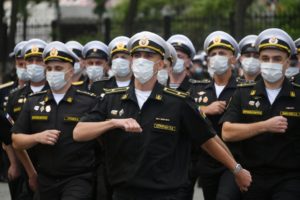For those wondering what Russia is up to, at least part of the answer has been revealed. The Associated Press reported that Russian President Vladimir Putin has approved a revised national security strategy (NSS) for 2021 that envisions the use of “symmetrical and asymmetrical measures” to counter “foreign states.”

(Photo by Yuri Smityuk\TASS via Getty Images)
The new Russian military thinking centers on a theme of self-sufficiency and an “international system based on ‘mutually beneficial’ cooperation.” Unlike the Biden administration’s U.S. Interim National Security Strategy Guidance, which spent a preponderance of its narrative detailing the perceived evils of climate change, the Kremlin’s NSS is more a hodgepodge of Russia’s national concerns.
Russia’s “go it alone” approach to a geopolitical strategy is tricky not only for the Kremlin but also for the United States. Writing for the Royal United Services Institute (RUSI), Elizabeth Buchanan, a fellow of the Modern War Institute at West Point, described an aspect of Russia’s NSS the United States should heed:
“The problem is that – as the coronavirus pandemic continues to illustrate – states cannot go it alone in the global system. This becomes a stark challenge when we consider Russia’s strategic interests in the Arctic and Antarctica – two zones in which international cooperation and collaboration are considered crucial. In recent years, and certainly in the past few months as Chair of the Arctic Council, Russia has touted its strength through cooperation in polar affairs.”
The Kremlin’s growing intrusion in the Arctic combined with a strategic plan to establish its strength in the region should pique U.S. interest as well as that of others with an equity stake above the Arctic Circle. It’s not a surprise, as Liberty Nation has reported: “Russia is increasing its presence and has as many as 24 deep-water Arctic ports.” This buildup is designed to ensure the Kremlin’s access to rich natural resources under the polar icecap.
The strategy document also takes on a broader range of topics not always associated with a country’s security interests. Meduza, a Russian-English language online daily news source headquartered in Moscow, explained that along with geopolitical issues, the NSS:
“ … recognizes an even wider range of national security threats, including (but not limited to) the online activities of transnational corporations, the ‘Westernization of culture,’ the imposition of foreign moral values, and the destructive impact of profanity on the Russian language.”
In addition to what might be considered fringe national security objectives, the Russian strategy document addressed conventional defense issues. NATO’s posture on Russia’s maneuvers along Ukraine’s borders as well as U.S. and NATO allies’ exercises in the Black Sea prompted mention in the federation’s strategic guidance:
“The strengthening of military dangers and military threats to the Russian Federation is facilitated by attempts to exert pressure on Russia, its allies, and partners, the build-up of [NATO’s] military infrastructure near Russian borders, the intensification of intelligence activities, and practicing the use of large military formations and nuclear weapons against the Russian Federation.”
Deutsche Welle reported that the “revised version of Russia’s national security strategy, published Saturday [July 3], outlined measures to respond to foreign influence. The move comes amid growing tensions between Russia and the West as the United States and its allies carry out naval drills in the Black Sea.”
 In a commentary in The Diplomat, Igor Denisov explained that, when it comes to China and Asia more generally, the NSS addresses the dynamics of the “RIC (Russia-India-China) triangle” as it appears through “a regional rather than a global lens.” Distancing itself from U.S. policy in the Indo-Pacific and South China Sea region, the Kremlin does not support the U.S. position that China should behave in the region on a more “rules-based order.” Another point explored in a substantial amount of space in the 2021 NSS is the declaration that “balancing relations with China is becoming increasingly important for the Russian political elite.” For the United States, a China-Russia alignment is challenging, no matter how loosely formed.
In a commentary in The Diplomat, Igor Denisov explained that, when it comes to China and Asia more generally, the NSS addresses the dynamics of the “RIC (Russia-India-China) triangle” as it appears through “a regional rather than a global lens.” Distancing itself from U.S. policy in the Indo-Pacific and South China Sea region, the Kremlin does not support the U.S. position that China should behave in the region on a more “rules-based order.” Another point explored in a substantial amount of space in the 2021 NSS is the declaration that “balancing relations with China is becoming increasingly important for the Russian political elite.” For the United States, a China-Russia alignment is challenging, no matter how loosely formed.
The 2021 NSS will disappoint those looking for startling revelations. However, the document does offer the insight that Russia, through modest strategic policy adjustments, is seeking to find the federation’s footing in the world of great power competition. For the curious, climate change is not Russia’s number one threat.
The views expressed are those of the author and not of any other affiliation.
~
Read more from Dave Patterson.




